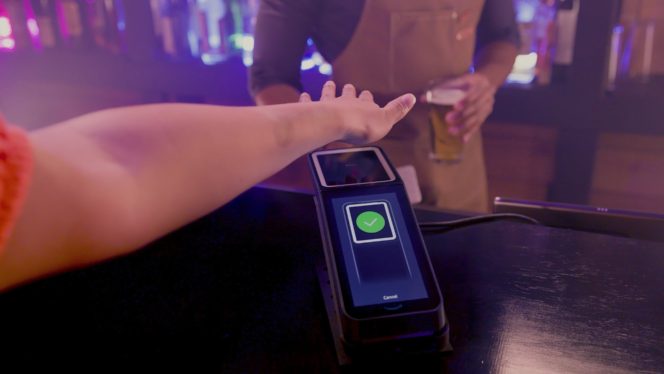Amazon One, the retailer’s palm-scanning payment technology, is now gaining new functionality with the addition of age verification services. The company announced today that customers using Amazon One devices will be able to buy adult beverages — like beers at a sports event — just by hovering their palm over the Amazon One device. The first venue to support this feature will be Coors Field, home of the Colorado Rockies MLB team. The technology will roll out to additional venues in the months ahead, Amazon says.
First introduced in 2020, Amazon’s biometric payment technology works by creating a unique palm print for each customer, which Amazon associates with a credit card the customer inserts in the sign-up kiosk upon initial setup, or with a card the customer has configured online in advance. If the customer has an Amazon account, that is also associated with their Amazon One profile information. These palm print images are encrypted and stored in a secure area in the AWS cloud, built for Amazon One, with restricted employee access.
To use the system, customers hold their hand over a reader on the device that identifies multiple aspects of their palm, like lines, ridges, and vein patterns, to make the identification.
By combining customer biometrics with payment card information and Amazon accounts, Amazon has created a tool that could be used to serve highly personalized ads, offers, and recommendations over time, if the company chooses.
In a FAQ, however, Amazon claims it “does not use or sell customer information for advertising, marketing, or any other reasons.”
Amazon has argued that palm reading is a more private form of biometrics because you can’t determine someone’s identity just by looking at their palm images. However, the company isn’t just storing palm images — it’s creating a customer database that matches palm images with other information.
After initially becoming available at Amazon’s own retail locations, like Amazon Go stores and Whole Foods, the Amazon One system has since expanded to various sports stadiums, entertainment venues, convenience stores, and travel retailers like Hudson and CREWS at several U.S. airports, in addition to Panera Bread through a partnership announced in March.
To now make the system capable of identifying someone’s age, customers can opt to update their ID to the Amazon One website. To do so, customers will go to one.amazon.com, upload photos of both the front and back of their government-issued ID, like a driver’s license, then snap a selfie to verify it’s them. Amazon says it doesn’t store these IDs after verification, which is performed by an unnamed ISO 27001–certified identity verification provider — a certification that references an international security standard.
After their age is confirmed, Amazon One customers will be able to purchase their adult beverages without having to pull out their ID from their pocket — they can be ID’d and pay for the drinks with a scan of their palm. When verified, the bartender will see a “21+” message appear on the screen along with the customer’s selfie, which they can then use to match to the customer placing the order. The customer can then scan their palm again to pay for the purchase.
Retailers may appreciate this technology because it could make lines move quicker, upping their potential sales and revenue. But it’s worth remembering that Amazon has not entered this market without secondary goals in mind, beyond simply speeding up checkouts.
The technology has been the subject of privacy concerns since its debut, which already led one early adopter to abandon their plans to use the readers, after receiving pressure from consumer privacy and advocacy groups. Denver Arts and Venues had been planning to leverage Amazon One for ticketless entry at Red Rocks Amphitheater — a big win for Amazon — but it cut ties with the retailer after the publication of an open letter that suggested Amazon could share palmprint data with government agencies and that it could be stolen from the cloud by hackers.
A group of U.S. senators also pressed Amazon for more information about its plans with customer biometrics shortly after the technology’s launch. Plus, Amazon is facing a class action lawsuit over failure to provide proper notice under a NYC biometric surveillance law, related to the use of its Amazon One readers at Amazon Go stores.
Despite these concerns, Amazon is pressing forward with its Amazon One expansion efforts, having recently landed the Panera deal, for instance.
“We are excited to team up with Amazon One to launch their age verification feature at Coors Field,” said Alison Birdwell, president and CEO of Aramark Sports + Entertainment, a provider of food and beverage and retail locations in various North American sports venues, including Coors Field. “Consumer preferences are ever evolving and demand for faster service models continues to grow. Amazon One’s latest capability directly responds to those demands by delivering a new level of convenience to the age verification process, shortening the time it takes to make an alcohol purchase, and improving the overall guest experience at Coors Field,” she said, in a statement.
Amazon One with age verification is available now at Coors Field, Amazon says.
Amazon’s palm-scanning payment tech will now be able to verify ages, too by Sarah Perez originally published on TechCrunch



